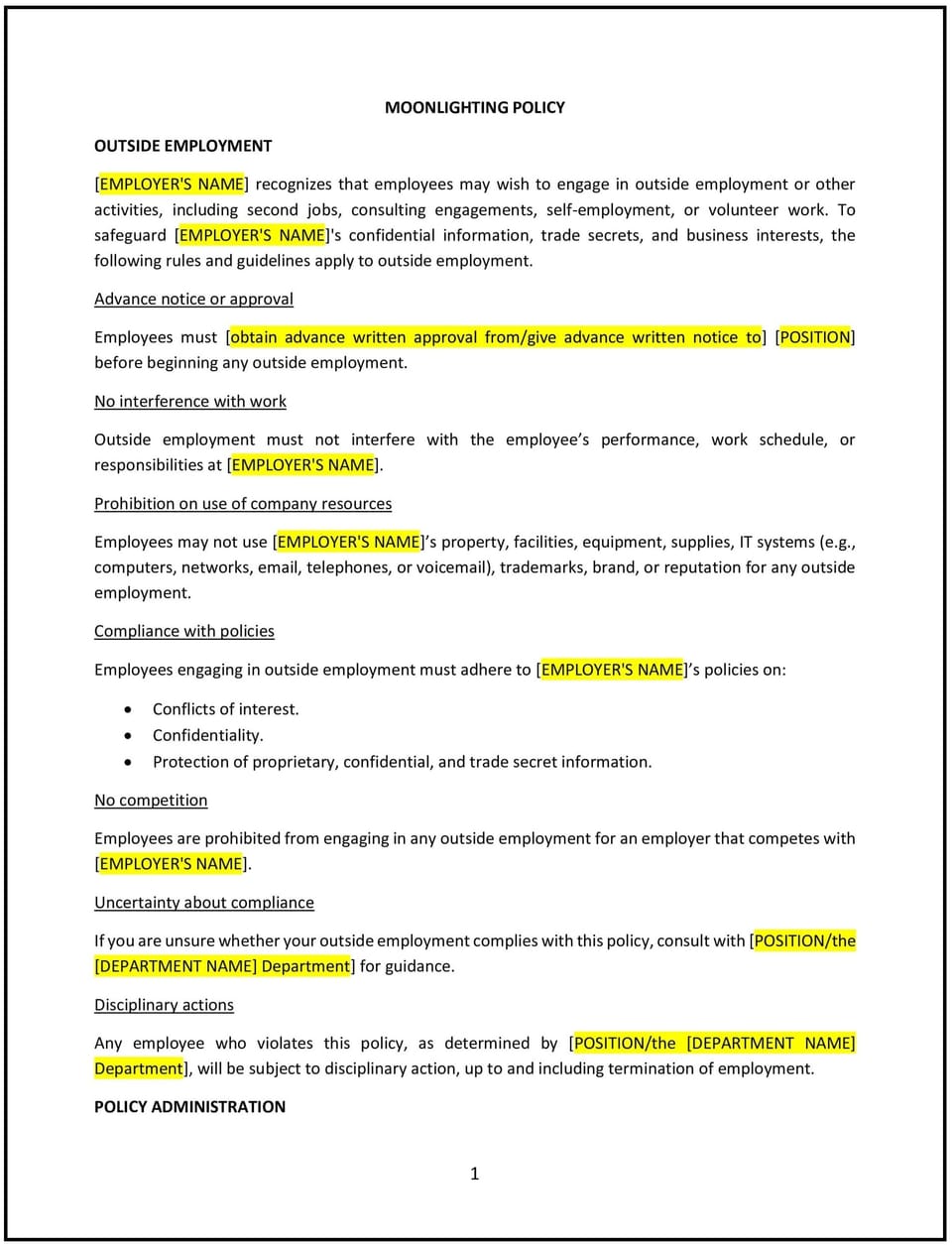Moonlighting policy (Georgia): Free template

Moonlighting policy (Georgia)
This moonlighting policy is designed to help Georgia businesses manage employees who hold additional jobs outside their primary employment. The policy outlines expectations, disclosure requirements, and potential conflicts of interest to ensure that external work does not negatively impact job performance or business interests.
By implementing this policy, businesses can promote transparency, minimize conflicts, and maintain a productive work environment.
How to use this moonlighting policy (Georgia)
- Define moonlighting: Specify what constitutes moonlighting, such as holding a second job, freelancing, or operating a side business.
- Require disclosure: Ask employees to disclose any secondary employment that might interfere with their primary job or create a conflict of interest.
- Address conflicts of interest: Prohibit external work that competes with the business, uses company resources, or breaches confidentiality agreements.
- Set performance expectations: Make it clear that employees must continue to meet their job performance standards, regardless of secondary employment.
- Provide a review process: Establish a procedure for evaluating and approving moonlighting requests, considering potential impacts on the business.
- Include corrective measures: Outline actions the business may take if moonlighting negatively affects performance or violates company policies.
- Communicate confidentiality requirements: Emphasize that employees must protect proprietary information and avoid sharing it with secondary employers.
- Review and update regularly: Periodically assess the policy to ensure it reflects changes in Georgia-specific workplace dynamics or business priorities.
Benefits of using this moonlighting policy (Georgia)
Implementing this policy provides several advantages for Georgia businesses:
- Promotes transparency: Requiring disclosure of secondary employment helps businesses address potential conflicts early.
- Protects business interests: Clear guidelines prevent misuse of resources or sharing of proprietary information.
- Maintains productivity: Ensuring that moonlighting does not interfere with job performance helps sustain operational efficiency.
- Reduces conflicts: A structured approach minimizes misunderstandings and disputes related to external work.
- Reflects Georgia-specific practices: Tailoring the policy to local industries and workforce trends ensures relevance and practicality.
Tips for using this moonlighting policy (Georgia)
- Communicate expectations: Share the policy with employees during onboarding and provide regular reminders about its requirements.
- Encourage transparency: Create an open environment where employees feel comfortable disclosing secondary employment.
- Monitor performance: Regularly review employee performance to ensure external work does not negatively impact their role.
- Address issues promptly: Act quickly to resolve conflicts of interest or performance concerns related to moonlighting.
- Update the policy as needed: Adjust the policy to reflect changes in business needs, workforce dynamics, or Georgia-specific trends.
Q: What types of work are considered moonlighting under this policy?
A: Moonlighting includes holding a second job, freelancing, or running a side business outside of an employee’s primary role.
Q: Are employees required to disclose secondary employment?
A: Yes, employees should disclose any external work that might interfere with their primary job or create a conflict of interest.
Q: Can employees work for competitors?
A: No, employees should not engage in work that directly competes with the business or creates a conflict of interest.
Q: What happens if moonlighting affects job performance?
A: If secondary employment negatively impacts job performance, businesses should address the issue and may require the employee to discontinue the external work.
Q: How should employees report secondary employment?
A: Employees should notify their supervisor or HR and provide details about the nature and scope of the secondary work.
Q: Are there restrictions on using company resources for external work?
A: Yes, employees should not use company equipment, time, or other resources for any external employment activities.
Q: How often should this policy be reviewed?
A: The policy should be reviewed annually or as needed to reflect changes in Georgia workplace practices or business priorities.
This article contains general legal information and does not contain legal advice. Cobrief is not a law firm or a substitute for an attorney or law firm. The law is complex and changes often. For legal advice, please ask a lawyer.


